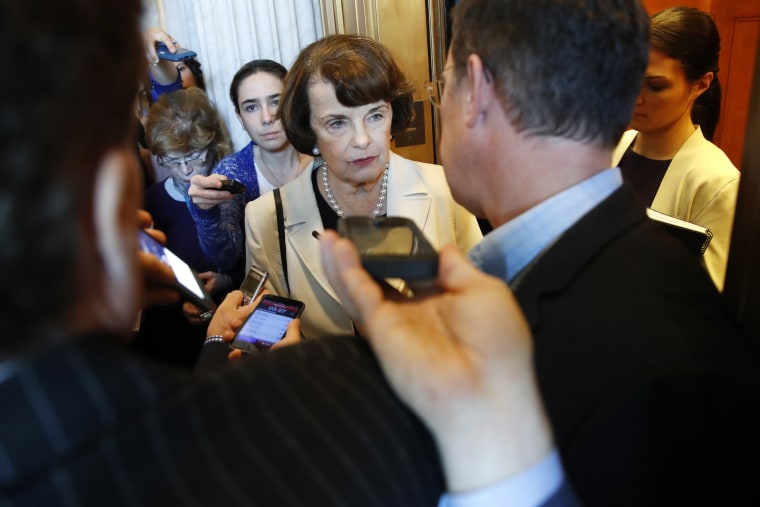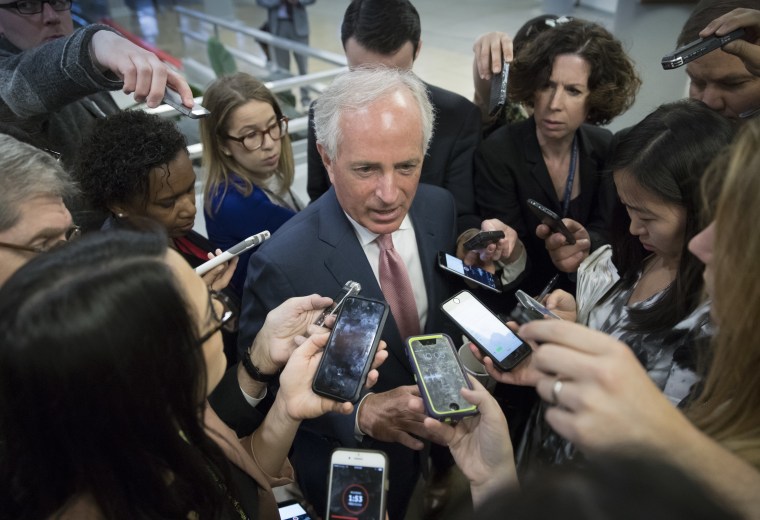The fierce political storm hit the nation's Capitol without warning Tuesday evening. With the House out of session for the week, the Senate had completed its business for the day and some staffers took advantage of what was supposed to be a slow week and headed out early.
Sen. Richard Durbin, D-Illinois, was holding a meeting in his office with labor leaders when one of the attendees got the notification on his phone that President Donald Trump had fired FBI Director James Comey.
Minutes later, the second highest-ranking Democrat in the Senate was on the floor giving a short, fiery speech that lasted a mere 30 seconds, demanding clarification of Comey’s ouster.
"I was stunned by it," Durbin said. "And then I stopped and thought for a moment that that is the only way that Donald Trump can stop ... this FBI investigation."
For the rest of the evening and into Wednesday, lawmakers scrambled — issuing statements, sending tweets, making the rounds on cable TV and, in the case of many Republicans, dodging reporters in Capitol hallways. The airwaves and social media feeds were filled with declarations of a constitutional crisis, comparisons to Watergate and defenses of the president's actions. There were also plenty of questions.
And while Democrats immediately pounced and began plotting their next steps, Republicans' loyalty to a president that they previously struggled to embrace was strained.
Some GOP loyalists questioned Trump's unexpected move, but the silence from most members epitomized the uncertain situation they faced even as they tried to get back to business as usual.
It took the Republican leader, Sen. Mitch McConnell, nearly three hours after the White House announced that Comey had been fired to release a statement — and it didn’t even mention Comey. The short two-sentence statement focused only on his future replacement, calling for a "full, fair, and timely confirmation" of a new director.
On Wednesday, House Oversight Committee Chairman Jason Chaffetz, R-Utah, said in a statement that he has expanded his request that the Justice Department inspector general look into the FBI's actions in the run up to the election to include Comey's firing.
Outraged and unified Democrats moved into action. In a sight rarely seen, they sat somber in their desks on the Senate floor Wednesday morning in a show of protest and determination, demanding that McConnell use his speech to open the Senate for the day to address Trump's decision.
Elsewhere, Democrats were eager to talk. In interviews, members expressed indignation that people who had the power to oversee an investigation into Trump had been fired, including Comey and U.S. Attorney Preet Bharara. They said the country is facing a constitutional crisis and made comparison to disgraced former President Richard Nixon.
"It was a test of our Constitution and our separation of powers in 1973 and we passed it. So we’re being tested again," Durbin said.
With the exception of Sens. Lindsey Graham of South Carolina, John McCain of Arizona and Bob Corker of Tennessee, all of whom like to talk to reporters, Republicans tried to ignore the news. McCain called for a select committee to be created, while Graham said a "fresh start" would be good for the bureau and the country.
Sen. Jeff Flake, R-Arizona, who criticized Trump during the campaign, looked sheepish and reluctant to talk to the press Wednesday morning as a few reporters followed him as he walked toward the exit on the second floor of the Capital after a vote.
"I'm trying to figure out the timing. I just don’t know why this happened now. I’m having trouble with it still," Flake said.
Other Republicans, however, ignored the reporters who swarmed the basement of the Capitol waiting for senators to arrive as well as the throngs of news media lingering outside the Senate floor as senators arrived to take a vote on an unrelated topic.
Sen. Ted Cruz of Texas, who is often eager to talk to the press, declined to comment NBC News three times. He said a statement would be coming from his office.
By mid-morning, a statement was released, saying "Mr. Comey had lost the confidence of both Republicans and Democrats, and, frankly, the American people."
Vice President Mike Pence was expectantly on the Hill as a precaution to take a tie-breaking vote on a measure that would have rolled back President Barack Obama’s rule restricting methane gas. In a blow to Republicans, the vote failed because Sens. McCain, Graham and Susan Collins of Maine voted against it.
Pence’s vote wasn't needed, but he appeared prepared to answer reporters’ questions, saying that Trump made the "right decision" at the "right time."
Republicans changed nothing in their schedule. They held their usual Wednesday lunch where they barely even discussed Comey, according to Sen. Corker.
"We might have spent 90 seconds" on Comey at lunch, Corker said. Corker is the chair of the Foreign Relations Committee and was meeting with the prime minister of Georgia when he heard the news Tuesday night, he said.
"Everybody’s on their own," he said of Republicans and their reaction. "There’s no policy statement that’s being put out. Everybody’s responding to this on their own."
Meanwhile, the minority party spent the day strategizing about how to rein in the president.
For Sen. Dianne Feinstein, D-Calif., who talked to Trump shortly before the news of Comey's firing broke, the episode was only the latest in what she described as a broader disappointment in his presidency.
"I had been hopeful that the administration would settle down," she said. "I had been hopeful that I wouldn’t have to look at tweets every day to know what the president is thinking."

On Wednesday morning, some of the president’s tweets were focused on Sen. Richard Blumenthal (D-CT), whose appearance on TV had attracted his attention. Trump sent several tweets to mocking the senator over a 2010 campaign scandal involving misrepresentation of his military service, including a description of how Blumenthal “cried like a baby and begged for forgiveness."
"His bullying won’t silence my calls for an independent special prosecutor," Blumenthal told NBC News when asked about the president’s taunts.
They huddled for more than an hour mid-morning to discuss next steps. They emerged from the meeting saying little, deferring to Senate Minority Leader Chuck Schumer.
But Sen. Mark Warner, the top Democrat investigating Russian meddling in the 2016 election and possible connections between the Trump campaign and the Kremlin, upped the ante, calling for a special prosecutor before any consideration of a new FBI director.
The Democrats haven’t officially adopted that position, but several told NBC News that many in the caucus would be supportive of it.
In the meantime, Schumer called for the top career civil servant at the Department of Justice to appoint a special prosecutor, for Comey to testify before the Senate and for Attorney General Jeff Sessions and Deputy Attorney General Rod Rosenstein to brief all senators on what happened.
How the episode impacts politics in the Senate isn't yet clear.
Some Democrats, like Massachusetts Sen. Elizabeth Warren, predicted a long-lasting fallout.
"When Donald Trump stepped in and fired the person who’s leading the investigation, I think everything changed on Capitol Hill," she told NBC News, "and now there’s a lot of people who realize that if we don’t get a special prosecutor, then we can never be confident that we got to the bottom of this."
For their part, Republicans are hoping that Trump's decision to fire Comey doesn't get in the way of their aggressive agenda to repeal the Affordable Care Act and pass tax reform.
Sen. Bill Cassidy, R-Louisiana, said he was confident his work on health care would not be impeded by Comey's ouster.
He then struggled to fight his way past a mob of reporters blocking the elevators as they questioned his Democratic colleagues. "Does anyone see the down button?" he said.


